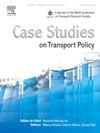Assessing the willingness to pay for Mobility-as-A-Service: An Agent-Based approach
Abstract
Mobility-as-a-Service (MaaS) is a user-centered system that offers an ensemble of mobility services through a single digital platform. Large-scale adoption of MaaS is expected to reduce car ownership, ease traffic congestion, and provide a financial advantage to users by offering different mobility services at affordable prices. This study analyses how subscription fees impact MaaS adoption. We simulate the choice of subscribe to a MaaS package by using an agent-based modelling approach on a realistic case study. By including the costs associated with vehicle ownership, we assume agents to perceive and experience the trade-off between MaaS fees and ownership expenses. The study aims to unravel the potential users’ characteristics and future perspectives for MaaS widespread adoption and explore the implications of MaaS for sustainability goals and policies. We observed that users who frequently travel long distances and perform more trips per day are more likely to accept higher fees. On the other hand, with cheap subscription fees users tend to use carsharing services for short trips. Finally, the study suggests that subsidizing MaaS or adopting policies to increase car ownership costs can decrease car ownership and increase revenues for the service providers.

 求助内容:
求助内容: 应助结果提醒方式:
应助结果提醒方式:


